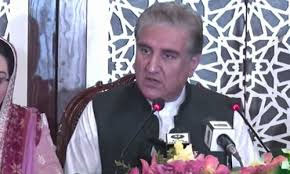Staff Reporter
Islamabad
Prime Minister Imran Khan on Wednesday presided over a meeting of the party’s core committee and decided to form a four-member committee for dialogue with Jamiat Ulema-e-Islam-F chief Maulana Fazlur Rehman.
The committee, headed by Defense Minister Pervez Khattak, will hold dialogues with Maulana Fazlur Rehman. The PTI’s core committee also decided to hold local bodies elections in Punjab and Khyber Pakhtunkhwa.
The meeting was attended by Punjab Chief Minister Sardar Usman Buzdar, Khyber Pakhtunkhwa Chief Minister Mahmood Khan, Governors, federal ministers and senior party leaders.
During the meeting, matters pertaining to country’s political, economic situation and rising inflation came under discussion. The prime minister took the participants in confidence over his visits to Saudi Arabia, Iran and China.
The meeting also discussed matters relating to dissolution of party’s provincial bodies.
The four members will be party representatives from the four provinces and their names will be finalised today. The committee will also approach the opposition parties.
Sources said that Prime Minister Imran Khan is of the opinion that there is no harm in holding talks with the JUI-F to reach a political solution.
Meanwhile, ruling out possibility of talks with the government, Jamiat Ulema-i-Islam-F chief Maulana Fazlur Rehman on Wednesday said negotiations can take place only after the prime minister resigns.Rehman outright rejected any possibility of talks with the government “before a resignation is handed in”. “We have no knowledge of such a committee and neither have we been contacted,” he said.
“Before any talks take place, a resignation is mandatory, so that the situation post-resignation can be debated,” said the JUI-F chief. “No negotiation can take place on the condition of a resignation.”
His statement came after Foreign Minister Shah Mehmood Qureshi said the government has formed a committee to hold talks with the JUI-F.
Earlier, Foreign Minister Shah Mahmood Qureshi, talking to media announced the government’s decision to “engage with Fazlur Rehman” in response to the JUI-F chief’s declaration to march on Islamabad on October 31.
The minister said that a small political committee has been formed “to get in touch with Maulana Fazlur Rehman”, which will be headed by Defence Minister Pervez Khattak.
“We are a political party and are fully capable and willing to deliver a political solution to political matters,” said Qureshi. The foreign minister said that if anything the JUI-F chief says during the resultant talks “has political weight, we are ready to listen to it and if a reasonable solution emerges, we will accord that priority”. “It is not that we have any fear, I must lay stress on this.
“If someone thinks that with a dharna, governments can be sent packing then we have a 126-day experience in this […] we are not novices in the matter,” said Qureshi. He reiterated that a political solution to the conflict must be sought, explaining that Pakistan is now fighting for the Kashmir cause on international fora and a unified stance must be presented in that regard.
“October 27 is that despicable day on which Indian forces landed in Srinagar and captured Kashmir,” he said, pausing to lay emphasis on the word to highlight the solemnity that must be accorded to the day.
He said that the government’s Kashmir Cell had therefore decided to observe the day with due respect and in solidarity with Kashmiris. “So we have to see whether we harm this larger purpose in pursuit of a narrower, local agenda,” he said.
Qureshi, in his press conference, also spoke of the premier’s visit to Saudi Arabia and his individual meetings with Saudi King Salman and Crown Prince Mohammad bin Salman a day earlier.
He said that the entire senior Saudi leadership, including the foreign minister, minister of state, national security adviser was present during the meetings.
“We presented Pakistan’s standpoint, discussed the region’s needs, and relayed Iran’s sentiments to them,” said the foreign minister.
He said that the crux of the conversation that took place can best be summed up this way: “I can now see the dark clouds of war and conflict that were looming above our heads slowly dispersing. Pakistan’s number one objective was this: that we do not end up suffering another conflict.”
We realised there was no easy solution to the conflict, which had seen many interventions from Pakistan and the international community in the past, said the minister.
“Yesterday’s meeting was very encouraging and I believe the one thing we agreed upon was that a peaceful, diplomatic process will be given preference. And all misunderstandings must be resolved through dialogue,” said Qureshi. He said that a mechanism for a way forward is currently under deliberation.










